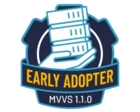We have a very old (clunky) program that displays the last edit date for source and the last compile date for object code. I'm wondering if any of you learned folks have a clean, effective way of doing this that might be helpful? TIA...
------------------------------
Jeff Teter
Woodforest National Bank
The Woodlands, TX
------------------------------
Last compile date, last edit date
Sign up
Already have an account? Login
Welcome to the Rocket Forum!
Please log in or register:
Employee Login | Registration Member Login | RegistrationEnter your E-mail address. We'll send you an e-mail with instructions to reset your password.




